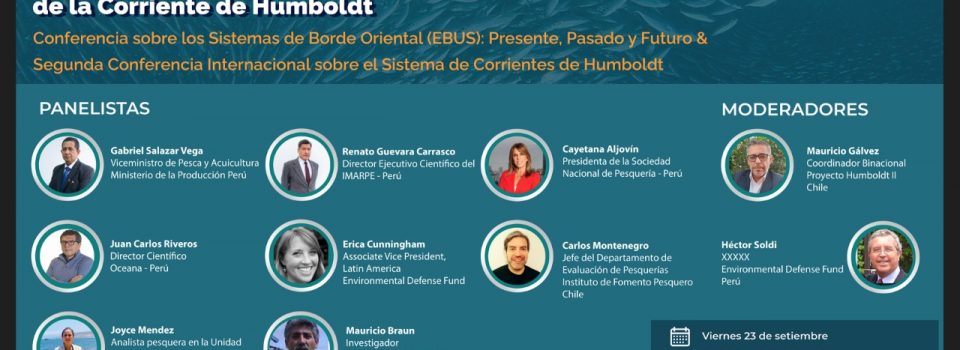Side Event: From Science to Policy in Humboldt Current Fisheries
October 16th, 2022The event will take place on September 23rd at Universidad Peruana Cayetano Heredia and will include national and international specialists participation.
What is the importance of science for Humboldt Current System in Chile and Peru management main fishery? What benefits can scientific tools provide for sustainable fisheries that are resilient to climatic change ? These and other questions will be addressed in the event “From Science to Humboldt Current Fisheries Policy“, organized jointly by Humboldt II project and Environmental Defense Fund NGO, within the framework of Eastern Rim Upwelling System Conference (EBUS): Present, Past and Future – Second International Humboldt Current System Conference.
The event will be held on Friday, September 23rd, at 5:00 p.m. at Universidad Peruana Cayetano Heredia, and aims to promote discussion and demonstrate the importance of the connection between advanced science and public policies to achieve sustainable fisheries management. and resilient to climatic variations of the Humboldt Current. Likewise, it will be broadcast live through the Facebook of the National Fisheries Society https://bit.ly/FBLIVESNP.
The occasion will include the participation of Fisheries and Aquaculture Vice Minister from Peru, Mr. Gabriel Salazar Vega; Institute of the Sea of Peru Scientific Executive Director Mr. Renato Guevara Carrasco; Mrs. Cayetana Aljovin National Fisheries Society,President ; Oceana NGO Scientific Director , Mr. Juan Carlos Riveros; Associate Vice President for Latin America, Ms. Erica Cunningham; Head of Chilean Fisheries Development Institute Fisheries Assessment Department ; Mr. Carlos Montenegro; Mrs. Joyce Méndez, Specialists from Pelagic Fisheries Unit of Undersecretary of Fisheries and Aquaculture of Chile and Mr. Mauricio Braun, of the Center for Applied Research of the Sea of Chile, who together will reflect on the following topics:
- How to move from science to action. Highlighting long-term experience of Chile and Peru in managing anchoveta fishery, one of the most important single-species fisheries globally.
- How to achieve science-based policy. Emphasizing scientific institutions importance in development of protocols necessary for correct decision-making, taking examples and experience of anchoveta fishing sector.
- How to translate scientific information for decision makers. Bringing into discussion the need for adequate language in scientific reports and protocols for policymakers to make the best decisions.
- What benefits can scientific tools provide. Science must allow the development of protocols and other tools for those responsible for fisheries policy to clearly assess the risks of the decision-making process.
- How to achieve mutual trust between scientific and political communities. Highlighting the importance of mechanisms to improve mutual understanding and trust of these communities in order to better understand each other’s institutional culture.
- How to guarantee transparency and information exchange. Promoting the need to prepare timely and open reports to the scientific community and society, on the decision-making process.
The event is organized within the framework of Humboldt II Project activities, executed by Vice Ministry of Fisheries and Aquaculture of Peru (VMPA-PRODUCE) and Fisheries and Aquaculture Undersecretariat (SUBPESCA) and implemented by the United Nations Program for Development (UNDP), with co-financing from the Global Environment Facility (GEF).
Humboldt II initiative main objective is to facilitate ecosystem-based fisheries management and ecosystem restoration in the Humboldt Current System for the sustainable and resilient provision of goods and services from the shared living marine resources of Chile and Peru.
Source News and Image organization of the event
